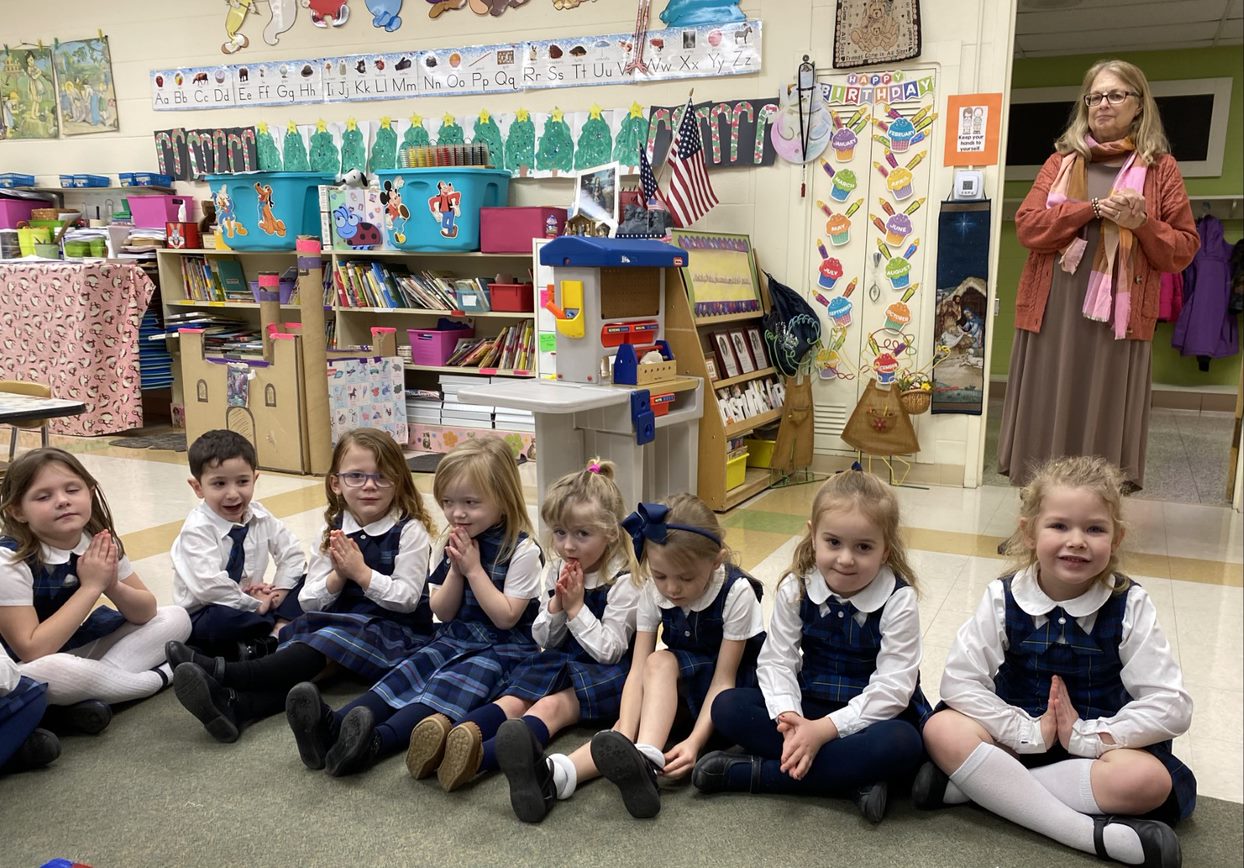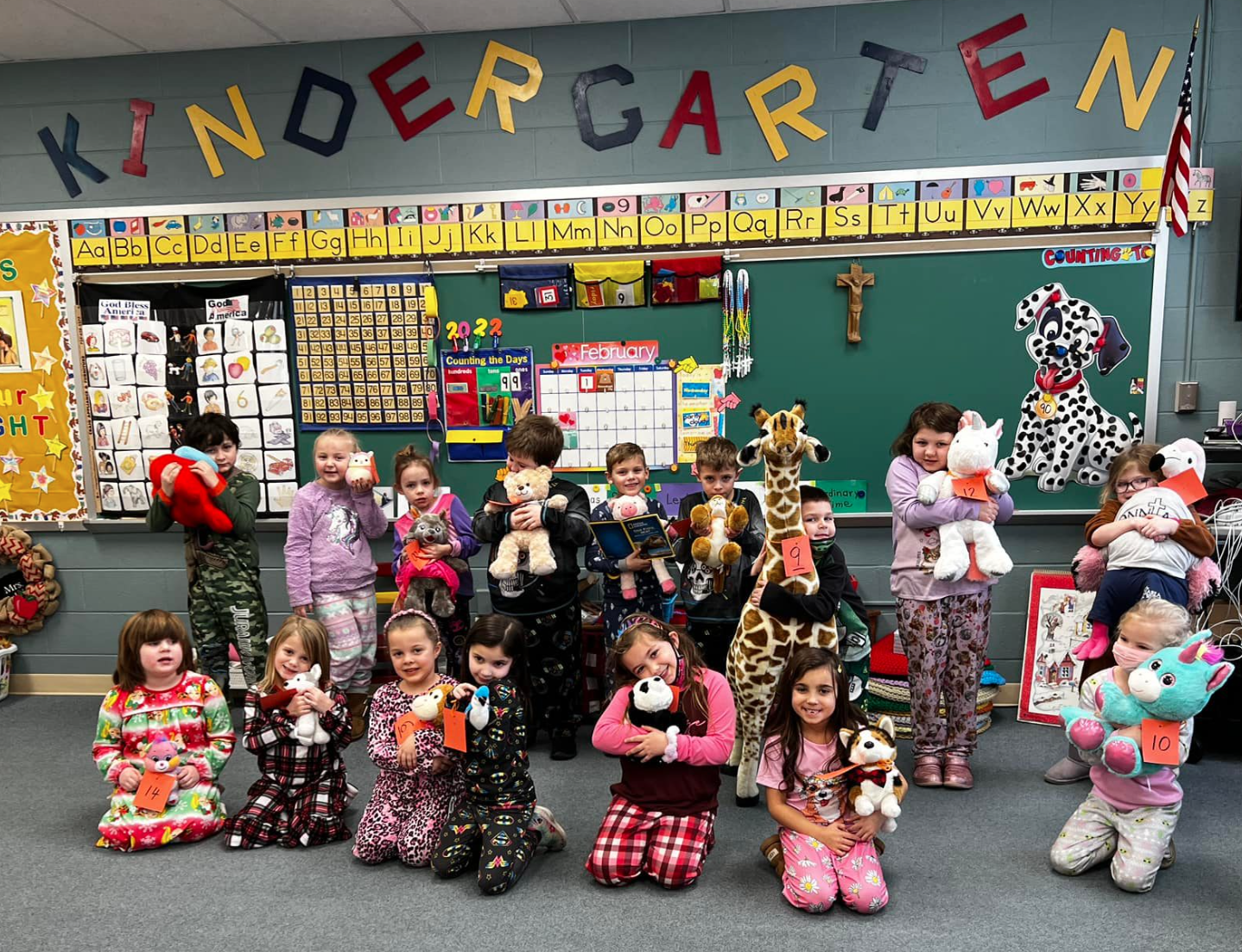Preschool

Our preschool program is designed for four year olds. Your child should be four by the September 1 cut off. If we have room for three year olds we will accept them, if they will turn four by December of that school year. Those children will be placed on a waiting list to be determined in the summer prior to the start of the school year. All students must be potty-trained and able to care for their own needs.
Available options:
- Five Full Days: 8:15 a.m. to 3:00 p.m.
- Three Full Days: 8:15 a.m. to 3:00 p.m.
- Five Half Days: 8:15 a.m. to 11:30 a.m.
- Three Half Days: 8:15 a.m. to 11:30 a.m.
We believe it is very important to have our preschool children involved in social play experiences. For some, this is their first experience learning to socialize with others. Children are engaged in dramatic play. They learn listening behaviors, and engage in one-on-one and group discussions. Interactions with each other is a vital part of the preschool curriculum.
Besides social encounters, the children learn to follow directions, express thoughts, and develop listening skills. They are given opportunities to engage in ‘table’ experiences, completing ‘projects’ that promote a solid basis in preparing for kindergarten. These include sound and symbol relationships, memorization of songs and poems, and determining meaning from spoken language or stories. They learn to identify alphabet letters and recognize high frequency words. Classroom activities encourage the strengthening of fine motor skills, eye-hand coordination and introduce our children to the basic strokes of letter formation.
Math skills include sorting, problem solving, geometric shapes, patterns, time, size, capacity, counting numbers, counting by twos, and students are encouraged to advance in math skills according to their potential.
Faith formation is a very important piece to our purpose. To access the religion curriculum, which begins in preschool, please visit the Catechetical Curriculum section on the Diocese of Greensburg website.
Our preschoolers attend music class twice a week, physical education twice a week, art once a week, and Spanish once a week. Together, these pieces of the curriculum help to build a wonderful educational, spiritual, and physical base to move forward for healthy development.
Kindergarten

Our kindergarten program is full day. Children entering kindergarten must be five years of age by September 1 of that school year. The environment is designed to enhance and motivate the learners. Our kindergarten children begin their technology instruction at this level. In addition to their regular classes, the children attend music twice a week, physical education twice a week, art classes, Spanish, and participate in our prayer services.
The children in our kindergarten program develop academically, socially, emotionally, and spiritually. The environment is inviting and motivational.
Listed below, please find more information about each subject area.
Language Arts
| Handwriting – Introduction of manuscript – Development of eye-hand coordination, small and large muscles via cross-curricular activities |
| Oral Language (Speaking, Listening, Discussion) – Conflict resolution activities designed to utilize the appropriate use of language to solve problems and express feelings – Memorization of songs, poetry, plays and Bible verses – Identification of the meanings of spoken words (vocabulary) – Utilization of basic speaking vocabulary – Demonstration of listening for specific information – Determination of meaning from spoken language and stories |
| Reading – Phonemic awareness concepts – Connections between oral and written language – Concepts of print – Phonics, letter-sound correspondence – Word and sentence reading |
| Writing – Sound/symbol relationships – Pre-writing strategies – Spelling approximations – Beginning use of punctuation – Journal writing – Sentence writing |
Mathematics
| Mathematics – Sorting – Patterning – Counting numbers – Writing numerals – Adding and subtracting single-digit numbers – Shape recognition – Symmetry – Non-standard measurement – Telling time – Graphing data – Estimating – Problem-solving – Geometry – Measurement – Counting coins – Comparing sets – Calendar concepts |
Science
| Earth Science – Locations of objects in the sky – Sources of energy – Seasons |
| Life Science – All about me – Plants and animals |
| Physical Science – Observable properties of objects – Exploring matter – Solids, liquids, gasses – How things move |
Social Studies
| Social Studies -Citizenship – Working together, rules and responsibilities in society – Family and friends – Patriotism and patriotic symbols – Holidays – Historical leaders – Famous American Presidents – Diversity Studies – Needs and wants – Beginning map skills |
Religion
At Conn-Area Catholic School our main focus is teaching our children to be “Centered in Christ.” From preschool through sixth grade, our goal is to have each child build a greater relationship with Jesus. We want them to make his teachings the focus of every decision they make so that when they become the leaders of the future, he will be the guidance they turn to for direction.
Learn more about the diocesan religion curriculum.
Art
Art is a wonderful way to express your thoughts and feelings. It is an opportunity to think in a different way, as the children consider color, texture, shape, contrast, content and style. It taps into a different part of the brain. We look forward to developing the program even further.
Music
Music is a must in the elementary school. We believe music has such a wonderful impact on student learning that we provide our students with music classes twice a week. Children learn basic music skills, as well as singing, playing the bells, and acting as cantors at the Masses. The children are involved in two musical productions – an Advent/Christmas Program and a Spring Musical Program. All grade levels from preschool through sixth grade are involved.
Physical Education
Physical education for students in kindergarten through second grade includes different activities that promote motor skills and students’ physical well being. Some of the focus areas include:
| Fine Motor – Throwing, catching and striking skills (Hand-eye coordination skills): Over/underhand, Balls, Bean bags – Ball handling: Dribbling, Shooting, Passing – Kicking: Stationary and moving ball, Trapping and receiving |
| Gross Motor – Jumping and landing – Skipping – Balance – Fitness games and relays – Jump roping – short rope – Parachute activities |
| Presidential Fitness Training & Testing – Fitness components include: Strength, Flexibility, Cardiovascular endurance, Exercise/fitness games |
| Specific and Creative Movement – Locomotor and non-locomotor skills – Spatial awareness – Balancing – Effort action – Games |


